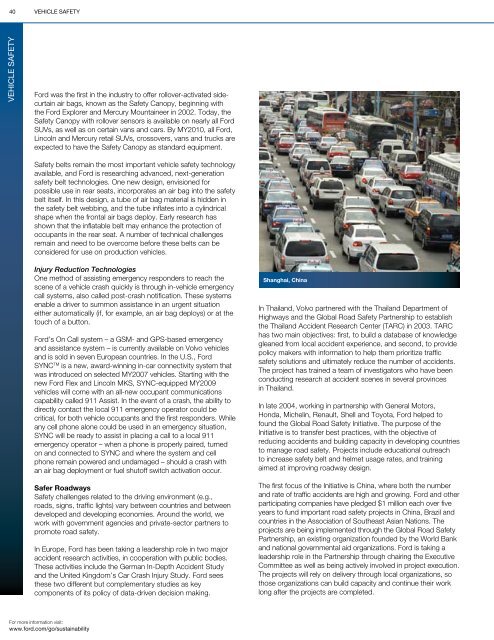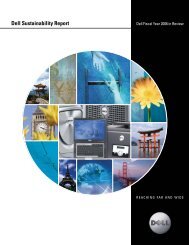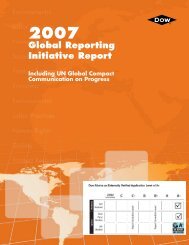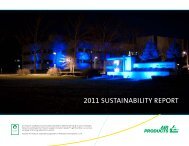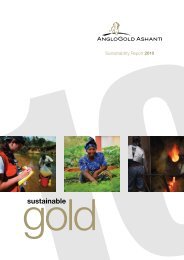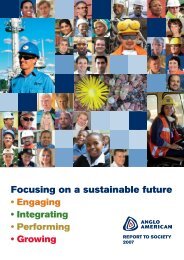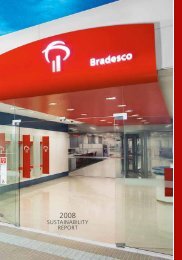Blueprint for Sustainability - Corporate - Ford Motor Company
Blueprint for Sustainability - Corporate - Ford Motor Company
Blueprint for Sustainability - Corporate - Ford Motor Company
- No tags were found...
You also want an ePaper? Increase the reach of your titles
YUMPU automatically turns print PDFs into web optimized ePapers that Google loves.
40Vehicle safetyVEHICLE SAFETY<strong>Ford</strong> was the first in the industry to offer rollover-activated sidecurtainair bags, known as the Safety Canopy, beginning withthe <strong>Ford</strong> Explorer and Mercury Mountaineer in 2002. Today, theSafety Canopy with rollover sensors is available on nearly all <strong>Ford</strong>SUVs, as well as on certain vans and cars. By MY2010, all <strong>Ford</strong>,Lincoln and Mercury retail SUVs, crossovers, vans and trucks areexpected to have the Safety Canopy as standard equipment.Safety belts remain the most important vehicle safety technologyavailable, and <strong>Ford</strong> is researching advanced, next-generationsafety belt technologies. One new design, envisioned <strong>for</strong>possible use in rear seats, incorporates an air bag into the safetybelt itself. In this design, a tube of air bag material is hidden inthe safety belt webbing, and the tube inflates into a cylindricalshape when the frontal air bags deploy. Early research hasshown that the inflatable belt may enhance the protection ofoccupants in the rear seat. A number of technical challengesremain and need to be overcome be<strong>for</strong>e these belts can beconsidered <strong>for</strong> use on production vehicles.Injury Reduction TechnologiesOne method of assisting emergency responders to reach thescene of a vehicle crash quickly is through in-vehicle emergencycall systems, also called post-crash notification. These systemsenable a driver to summon assistance in an urgent situationeither automatically (if, <strong>for</strong> example, an air bag deploys) or at thetouch of a button.<strong>Ford</strong>’s On Call system – a GSM- and GPS-based emergencyand assistance system – is currently available on Volvo vehiclesand is sold in seven European countries. In the U.S., <strong>Ford</strong>SYNC TM is a new, award-winning in-car connectivity system thatwas introduced on selected MY2007 vehicles. Starting with thenew <strong>Ford</strong> Flex and Lincoln MKS, SYNC-equipped MY2009vehicles will come with an all-new occupant communicationscapability called 911 Assist. In the event of a crash, the ability todirectly contact the local 911 emergency operator could becritical, <strong>for</strong> both vehicle occupants and the first responders. Whileany cell phone alone could be used in an emergency situation,SYNC will be ready to assist in placing a call to a local 911emergency operator – when a phone is properly paired, turnedon and connected to SYNC and where the system and cellphone remain powered and undamaged – should a crash withan air bag deployment or fuel shutoff switch activation occur.Safer RoadwaysSafety challenges related to the driving environment (e.g.,roads, signs, traffic lights) vary between countries and betweendeveloped and developing economies. Around the world, wework with government agencies and private-sector partners topromote road safety.In Europe, <strong>Ford</strong> has been taking a leadership role in two majoraccident research activities, in cooperation with public bodies.These activities include the German In-Depth Accident Studyand the United Kingdom’s Car Crash Injury Study. <strong>Ford</strong> seesthese two different but complementary studies as keycomponents of its policy of data-driven decision making.Shanghai, ChinaIn Thailand, Volvo partnered with the Thailand Department ofHighways and the Global Road Safety Partnership to establishthe Thailand Accident Research Center (TARC) in 2003. TARChas two main objectives: first, to build a database of knowledgegleaned from local accident experience, and second, to providepolicy makers with in<strong>for</strong>mation to help them prioritize trafficsafety solutions and ultimately reduce the number of accidents.The project has trained a team of investigators who have beenconducting research at accident scenes in several provincesin Thailand.In late 2004, working in partnership with General <strong>Motor</strong>s,Honda, Michelin, Renault, Shell and Toyota, <strong>Ford</strong> helped tofound the Global Road Safety Initiative. The purpose of theInitiative is to transfer best practices, with the objective ofreducing accidents and building capacity in developing countriesto manage road safety. Projects include educational outreachto increase safety belt and helmet usage rates, and trainingaimed at improving roadway design.The first focus of the Initiative is China, where both the numberand rate of traffic accidents are high and growing. <strong>Ford</strong> and otherparticipating companies have pledged $1 million each over fiveyears to fund important road safety projects in China, Brazil andcountries in the Association of Southeast Asian Nations. Theprojects are being implemented through the Global Road SafetyPartnership, an existing organization founded by the World Bankand national governmental aid organizations. <strong>Ford</strong> is taking aleadership role in the Partnership through chairing the ExecutiveCommittee as well as being actively involved in project execution.The projects will rely on delivery through local organizations, sothose organizations can build capacity and continue their worklong after the projects are completed.For more in<strong>for</strong>mation visit:www.<strong>for</strong>d.com/go/sustainability


